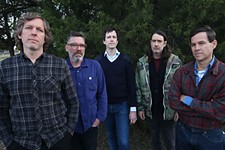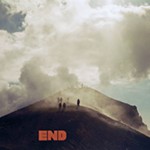Within These Walls
A chat with Damon Krukowski and Michio Kurihara.
By Austin Powell, 11:47AM, Fri. Oct. 19, 2007
Damon & Naomi’s self-produced seventh album, Within These Walls, released on their 20/20/20 label, is the duo's most intensely intimate and elegant work to date. Progressing from their work in seminal shoegaze group Galaxie 500, the movements are accentuated once more with the peripheral brushstrokes of Michio Kurihara’s electric guitar. Off the Record recently spoke with Damon Krukowski about communicating with Kurihara, the influence of Frank Sinatra, and sharing a bill with Japan’s doom masters Boris. They all play tonight at Mohawk, for what’s being billed the "Roaring Silence Revue."
Off the Record: Other than Michio Kurihara, what do you feel is the connection between the music of Damon & Naomi and Boris?
Damon Krukowski: I think that we share a lot of sympathies. The idea to tour together was meant to stretch the audience's idea of what might go together. We are fans of Boris. There’s also a musical sympathy in that they’re not afraid to play slowly or let things change slowly in the music; they allow a sound time and space to be fully heard. We do that a very low volume, but they do it with their amps turned all the way up.
OTR: You’re not really eclectic in the same way that Boris is, but both bands really cover a broad spectrum of sound as well.
DK: That’s exactly right. If you just look at who they’ve collaborated with you can see their desire to explore while still retaining their own identity, which is something that’s familiar to us as well. We choose people not to play a role in our band, but to introduce different musical personalities. It’s been interesting to see their collaboration with Kurihara side by side with ours. They’re a thundering band live, probably the loudest band I’ve ever heard. Our sound guy just got off the Dinosaur Jr. tour, and he thinks they’re loud.
OTR: Do you feel like Kurihara plays the same role for Boris as he does with Damon & Naomi or does it seem like it's two separate processes for him?
DK: He works really hard to adjust himself to whoever he's playing with. The precision is identical in both cases, but he’s actually carrying two different guitars on this tour because he didn’t feel like the same guitar could work for both bands. He has two sets of effects pedals as well. He’s using the same amp with us, but he uses two of them with Boris. There’s a whole process that he’s going through to shape the sound. That said, it always sounds like him. That’s part of the success of his preparation. Neither sound is fighting against him.
We have cellist in the band now, Helena Espvall. Kurihara very much wants to change his sound because of it. It’s very important for him to hear the overall sound and for him to think about where the guitar fits in there, which is part of his special talent. He has a great ear.
OTR: What was your first experience with Ghost?
DK: Naomi and I had the first two Ghost records that you could only get as imports from Japan through Forced Exposure. They work with this great Japanese label called PSF [Psychedelic Speed Freaks]. It was our friend at Forced Exposure who actually turned us on to the Ghost records. It had been a long time since we had heard a living, working band that made us excited about music as Ghost had. We wrote them a fan letter that went to an old address and they never received it. Then a promoter wanted to book a tour for a band that we were in at the time called Magic Hour. We weren’t sure if the promoter was for real, so we laid down what we thought was an impossible stipulation: If you get our favorite band in the world to co-headline, we’ll do it. A month later, he called us back and said, ‘OK. Ghost is coming.’ Sure enough, we went to the airport and picked them up and there they were. Their English was not that good then, and our Japanese was non-existent at the time, but we became really good friends. That was in 1995. On that tour, Drag City saw them in Chicago and signed them. On our second tour of the U.S., Kurihara was in the band and we had never seen a lead guitarist like him before. It completely knocked us out. Then we made an album together on Sub Pop, and Kurihara was on that. The rest of the band had day jobs, but Kurihara was able to come with us for all of the tours as a trio.
OTR: Is there still a bit of a language barrier?
DK: No, there really isn’t. It’s quite amazing. We picked up a bit of Japanese and Kurihara can speak a bit of English. We’ve had tours all over the world with bands that spoke other languages. It’s something that we’ve always felt comfortable doing. The first Ghost tour was a bit difficult, but we learned all of the key rock phrases pretty quickly. Now we’re able to communicate on all sorts of levels.
OTR: Your label, 20/20/20 Records, put out Kurihara’s solo debut, Sunset Notes. Were you at all surprised by the variety on the record?
DK: He plays so many different styles that I wasn’t sure which one he was going to choose. He chose them all. What I wasn’t surprised by was how poetic and emotional it is. The record and the way it’s tied to specific times and seasons tells a lot about his character and his personality. There’s an emotional core to all of those different styles. I’ve heard him say in interviews that he’s not a technical player, but he’s so skilled. I think what he means is that he doesn’t play for technique’s sake. He doesn’t assert himself that way. The playing comes out of an emotional core or feeling.
OTR: He’s always accentuating the work of others. I was fascinated to just hear what came out when he was pushed to the front.
DK: He tends to want to stand on the side of the stage and we are always having to keep him physically on the stage. Last night in Seattle we were playing on a small stage, and Boris had a lot of amps, so Kurihara was actually standing off the stage where the sound guy was. It’s always a challenge to get him to step up into the spotlight.
OTR: What were you hoping to accomplish on Within These Walls?
DK: Last time, we used the horns as a final layer to accent the music that was already there. The only new instrumentation really is the strings, which we’ve never used before. We were sort of thinking of the orchestration on Scott Walker and Nick Drake records and old Frank Sinatra. I’ve been on a huge Sinatra binge for the last two years, particularly his sad albums on Capitol. We got really into the idea of a sad concept album, which is something that we’ve always tried to shy away from. It’s a very small group that we’re working with, but we were thinking in terms of large orchestration. This was the first time where the lyrics were actually the impetus for the specific songs, to let them stand up clearly and be heard. If you listen to the Sinatra records, even when he has a 50-piece orchestra behind him, you can always hear his words. We wanted to do our own version of that. Not that we can sing like him, for God’s sake.
OTR: I picked up the International Sad Hits compilation your label put out. How would you say your world travels have affected your songwriting
process?
DK: The last album self-consciously reflected a lot of those influences. I don’t know if you noticed, but this is actually our first record without a cover song. It’s all about us. The songs are written from a very interior point of view. We actually had our release party in our living room. We’re not the type of people who throw parties. This record is about opening up doors though, so it seemed like an appropriate thing to do. I think the travels still influenced the record, but in a much more internalized way.
OTR: Does that mean the record is more comfortable for you, since it’s a more appropriate reflection of yourself?
DK: Actually, it’s much more uncomfortable. It’s been really difficult for us to release it because there are a lot of private things in there. When Naomi and I are putting songs together, we’re alone. It’s a weird thing to take what you’ve done together for each other and then put it out into the world as this public artifact. The moment when that happens is always pretty difficult.
A note to readers: Bold and uncensored, The Austin Chronicle has been Austin’s independent news source for over 40 years, expressing the community’s political and environmental concerns and supporting its active cultural scene. Now more than ever, we need your support to continue supplying Austin with independent, free press. If real news is important to you, please consider making a donation of $5, $10 or whatever you can afford, to help keep our journalism on stands.
Nov. 3, 2023
Sept. 29, 2023
Previews, Damon Krukowski, Boris, Michio Kurihara







